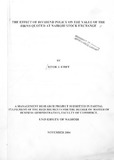| dc.description.abstract | The three major decisions of the firm are the investment, financing and the dividend decisions.
The crucial question in dividend policy is whether dividends have an influence on the value of the firm
given the firm's investment decisions. The objective ofthis study was to establish the effect of dividend
policy on the value of the firms quoted at N.S.E. Secondary data obtained from the N.S.E. library and
company libraries was used. Companies that were consistently quoted at the stock exchange for the
period of six years, from 1998 to 2003 and paid dividends during that period were included in the sample.
According to the findings of this study, dividend policy is relevant. Therefore an optimal dividend policy
exists. However, the relationship between dividend policy and the value ofthe firms quoted at NSE is
weak implying there are other factors (investment and financing decisions) other than dividend policy that
affect the value of the firm.
From the analysis, it was observed that there was a negative relationship between the dividend policy and
the value of the firms for the entire market. This supports the tax differential theory advanced by
Litzenberger and Ramaswamy in 1979. They argued that tax rate on dividends is higher than tax rate on
capital gains. Therefore, a firm that pays high dividends will have a lower value since shareholders pay
more on dividends.
However, it was observed that there was a weak positive relationship between the dividend policy and the
value of the firms in different sectors. This supports the information signalling effect theory advanced by
Ross in 1977. He argued that in an inefficient market, management could use dividend policy to signal
important information to the market, which is only known to them. For example, if management pays
high dividends it signals high-expected profits in future to maintain the high dividend level. However,
dividend announcements may not possibly reflect in the value of the firm because of weak form
efficiency (efficient market hypothesis) in the developing markets.
It was also observed that large firms generally had greater impact on the market than small firms. There
was a negative relationship between DPOR and the value of the large firms. But there was a weak
positive relationship between DPOR and the value of small firms. Large firms maintained clear and
consistent dividend policy, which affected their values more than in small firms. There were more large
firms quoted in the N.S.E than small firms hence they had more influence in the market. Local based
firms were observed to have more impact on the market than foreign-based firms. There was a negative
relationship between DPOR and the value of local based firms. It was also observed that government
influenced firms had more impact on the market. There was a negative relationship between the DPOR
and the value of the non-government and government influenced firms. | en |

